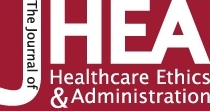Back Issue: Vol.8 No.2 (Fall 2022)
ISSN 2474-2309
Research Ethics
- Daniel J. Daly, Ph.D.
Address correspondence to: Daniel J. Daly, Ph.D. Associate Professor of Moral Theology. Boston College School of Theology and Ministry. Phone: 617-552-2285. Email: dalydc@bc.edu
Pages: 1-12
This paper addresses a perennial problem in Catholic organizational healthcare ethics. Catholic and secular ethicists have acknowledged that organizational healthcare ethics is underdeveloped. Scholars have traditionally focused on the “micro” issues arising in the clinical setting or the “macro” issues of national healthcare policy and health insurance. The “meso” or healthcare organizational level, involving both healthcare systems and hospitals has received far less attention. As a result, contemporary organizational healthcare ethics lacks a developed conceptual framework with which to analyze and guide the decision-making of HCOs. The paper responds to two specific deficiencies in the field. First, organizational ethics undertheorizes sociological realities. Second, the field employs exceedingly thin and incoherent ethical frameworks. Although scholars have introduced the term “organizational virtue,” they have yet to develop a robust account of the concept leaving healthcare leaders incapable of assessing organizational character or guiding moral decision-making. In sum, because neither “organization” nor “ethics” is well articulated, the entire project of organizational healthcare ethics loses its capacity to explain, guide, and assess human action and social outcomes. The paper directly addresses these deficiencies. First, it offers greater precision in the use of sociological terminologies, such as “structure,” “institution,” “organization,” and “culture.” Using critical realist social theory, the paper distinguishes between a social structure in the general sense, which is a “web of relations among social positions,” and an organization, which is a highly complex social structure containing positions of authority. Next, it synthesizes organizational theory with virtue theory to develop an account of organizational virtue ethics capable of aiding in organizational moral decision-making and assessment. It then articulates cardinal organizational virtues, including organizational prudence, justice, beneficence, and solidarity. The paper then applies the cardinal organizational virtues to a composite case.
Ethic Report
- Jonai Wabwire
Address correspondence to: Jonai Wabwire. Lecturer, Kisii University, Dept. of Communication Media and Information Sciences. Phone: 0710619475. Email: wabwirejonai05@kisiiuniversity.ac.ke
Pages: 13-20
Science reporting is not a daily routine in most media houses in Kenya and worldwide at large. Unlike sports, politics, business, arts and culture, Science reporting is generally placed on the fringes of mainstream journalism. A critical analysis of media operations, shows that there are various deep-rooted factors that tend to keep science at the bottom of newsgathering, packing and dissemination. The beginning point is journalism schools that traditionally avoid admitting students with science backgrounds or strong interest in science reporting, preferring those excelling in literature, languages, history and others. The courses offered hardly mention the coverage of science. In addition, issues such as media social responsibility, newsroom competition, newswriting basics and how they affect reporting complex scientific issues have been extensively addressed. The article has also addressed the critical challenges facing science reporting, bridged the divide between science and journalists by looking at the tips crucial for science journalism.
